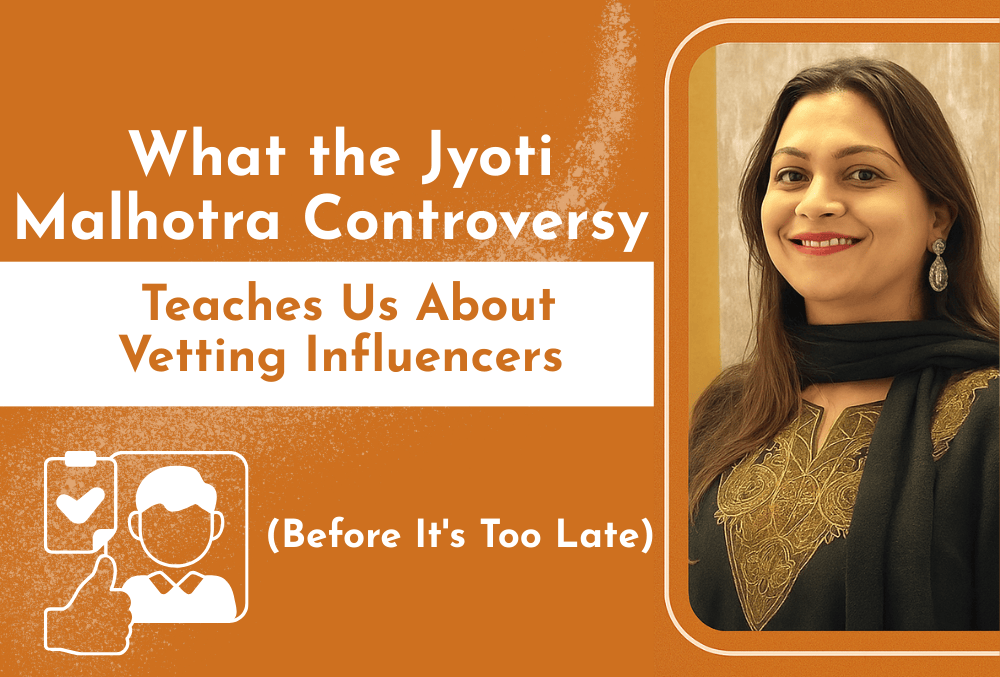In a digital world where influence travels faster than truth, the recent arrest of travel influencer Jyoti Malhotra — accused of leaking sensitive Indian information to Pakistan with eight accomplices — sent shockwaves through both the public and brand circles. Malhotra, once trusted for her content and social media presence, is now under scrutiny for acts that extend far beyond the influencer realm.
If you’re a brand collaborating with creators, this case isn’t just news — it’s a wake-up call.
The Influence of a Modern Creator
Influencers are brand ambassadors. Their faces, voices, and values represent the companies they work with. But when an influencer makes headlines for the wrong reasons — especially something as serious as national security threats — it puts every associated brand in a vulnerable spotlight.
This situation with Jyoti Malhotra isn’t about minor reputation hiccups. It’s about high-stakes brand risk.
Why Vetting Influencers Is Crucial for Brand Safety
Here’s what this incident reveals about the importance of influencer vetting:
1. Reputation is Collateral
Brands that previously worked with Malhotra are now in a race to distance themselves. But screenshots and past collaborations live forever online. Without proper background checks, brands risk unknowingly aligning with harmful narratives.
2. Social Presence ≠ Social Responsibility
Millions of followers don’t equal moral standing. A creator’s popularity should never be your only benchmark. Dig into who they are, not just how they post.
3. Due Diligence Isn’t Optional
This means:
- Checking criminal and legal records (where possible)
- Reviewing past collaborations
- Monitoring audience sentiment
- Scanning for controversial posts, affiliations, or ideologies
4. Real-Time Monitoring Matters
Creator profiles evolve. Today’s inspiration can be tomorrow’s headline. Continuous vetting is as essential as initial checks.
How to Vet Influencers: A Quick Guide for Brands
- Background Checks: Use automated tools or agencies to review their history.
- Content Audit: Review 6-12 months of posts for red flags.
- Engagement Quality: Are followers real? Are comments authentic?
- Brand Fit: Do they align with your values, not just your campaign?
- Cross-Check Partnerships: Who else do they promote or support?
Introducing SocioCreator: Your Brand’s First Line of Defense

At SocioCreator, we don’t just connect brands with influencers — we protect your reputation. Every creator on our platform undergoes:
- Manual + AI-powered vetting
- Behavior and sentiment analysis
- History of collaborations and audience insights
We ensure brands work with professionals — not just personalities.
A Real Takeaway for Brands
The Jyoti Malhotra case isn’t about one person. It’s about the risks of overlooking credibility in favor of clout. As the influencer economy grows, so does the responsibility on brands to partner wisely.
FAQs
Q1: Should I completely stop working with influencers now? A: Not at all. Influencer marketing is powerful — just ensure your collaborations are grounded in data, not just popularity.
Q2: How often should I vet an influencer? A: Initial vetting before collaboration, and then periodically if you maintain a long-term partnership.
Q3: What tools can help with influencer vetting? A: Platforms like SocioCreator, Modash, and CreatorIQ offer vetting features. SocioCreator adds a layer of manual intelligence.
Q4: What if a creator is involved in legal trouble after I collaborate? A: Act fast — issue a public statement, pause campaigns, and remove content where possible. Transparency builds trust.
Final Words
Reputation is hard-earned and easily lost. In an era where influencers can make or break your brand’s image, prevention isn’t just better than cure — it’s branding 101.
Collaborate with intent. Vet with intelligence. Partner with SocioCreator

